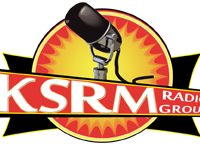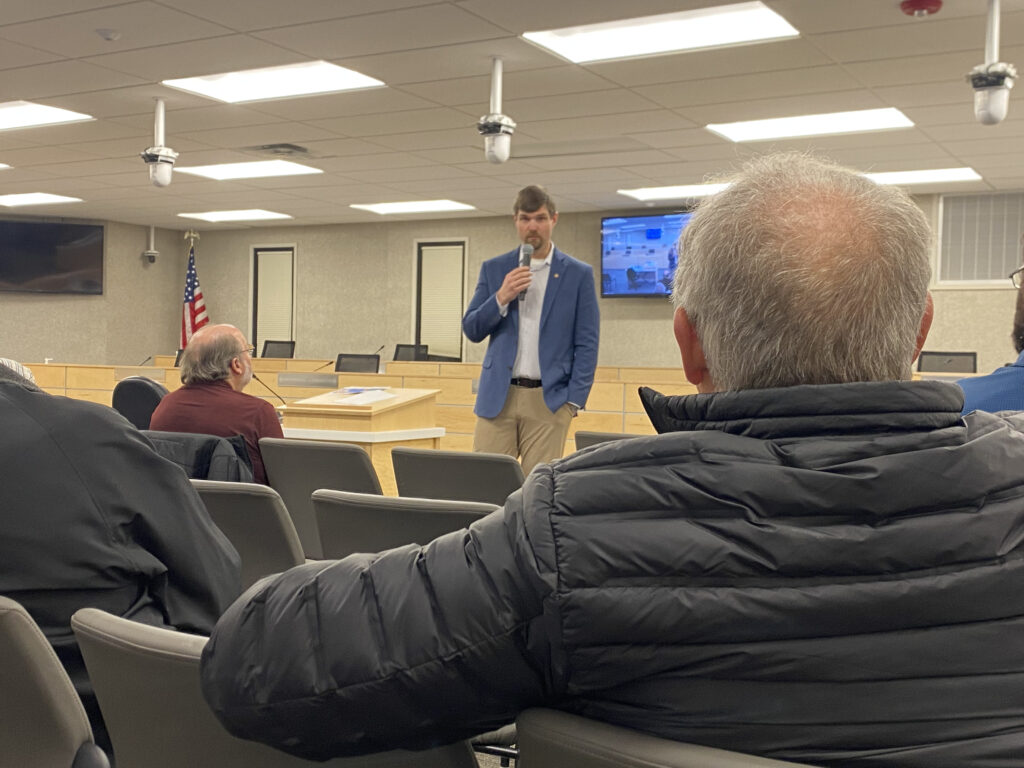He began the night with a brief PowerPoint presentation about Fiscal Year 2024 and its projected budget outcomes. In regards to fiscal stability, there have been no broad-based taxes and no increased taxes on the industry. Alaskans were also able to receive a $1,300 parament fund dividend check back in October. The blue section of the pie chart demonstrates revenues that come from the permanent fund earnings reserve and state investments. The orange part is state revenue that comes from oil and gas taxes. The smaller sections represent other state revenues, other non petroleum revenues, or other taxes.
During his presentation, Sen. Bjorkman also shared a graph showing inflation trends, and how they are affecting educational opportunities for the KPBSD.
The Senator also spoke on some his legislative accomplishments, including passing Senate Bill 87 (local lumber grading) and Senate Bill 126 (Architect and Engineer Registration). According to Bjorkman, significant progress has also been made on the SetNet Buy Back Bill.
Regarding road infrastructure, Bjorkman said that he, along with the members of the Borough are working closely with the Department of Transportation to improve road safety. One particular aim is to increase the number of lanes on certain roads. He is also looking to pursue alternatives to road brine, and continuing to monitor the K-Beach Flooding mitigation.
Bjorkman said that his overall goals for the 2024 year are fiscal stability, public safety, school funding, and road maintenance.
Department Of Transportation And Roads
There has been some concern regarding the idea of a divided highway, and Bjorkman calls it unacceptable and unsafe. He encourages the DOT to change their plans to create a five-lane highway system on the Sterling highway, very similar to how it is on the Kenai Spur Highway.
“People are used to using that type of traffic pattern. It’s safer than what we have now. And it’s a lot easier for folks to navigate because making U turns into into traffic that’s going 65 miles an hour, practically it’s not safe and it’s not acceptable,” said Bjorkman.
Ranked Choice Voting
Ranked Choice Voting was also brought up for discussion.
Bjorkman says that while there are bills in both the House and Senate seeking to repeal ranked choice voting, they have not moved in either body. According to the senator, however, by his knowledge there is an initiative by various Alaskans to gather signatures to repeal ranked choice voting. The signatures need to be turned in by January.
“So if, if rank choice voting is to go away, and it’s going to be the people that repeal it, just like they passed it,” said Bjorkman.
Fiscal Plan 2024
There has also been some concerns regarding the fiscal plan for 2024. In order to support the suggested plan, many questions have been put forward asking where those additional revenues would come from.
Bjorkman does say that the proposed plan does not have everything set in stone yet, that it could include some revenue, but not at this time. In order to have a responsible budget, Bjorkman says that engaging with the public about what should be expected from the government is key in order to have a responsible budget.
“I’m not willing to support a tax and new revenue until we have a spending cap in place that works. And until we can cap state spending, so that we don’t continue to grow our state government beyond in areas that are not mandated by the constitution. We have to be wise about how we spend state money and every idea about how we spend state money is not a good idea,” says Bjorkman.
Assembly member Tyson Cox was also present the meeting. He asked about some potential hurdles that could be expected with a potential Base Student Allocation (BSA) increase—that is the amount of money school districts across the star are given per enrolled student in there schools. Tyson fears that this will just be a one-time funding solution instead of an overall increase in funding.
Bjorkman mentioned Senate Bill 52 (an act relating to education: increasing the base student allocation; and providing for an effective date), which would increase an allocation and provide the schools and students with resources that they needed to get an excellent education.
But since there has been no response from the House, the school district budget has about a $13 million deficit. According to Bjorkman, if schools were to attempt to fix this deficit, it would result in the school district needing to lay off about a third of their teachers, which would equate to 130 teachers.
The schools have already cut librarians, counselors, interventionalists, as well as many language programs.
“Couple that together with declining enrollment, and you have a much different picture of what our local schools are able to provide as far as an educational menu for students to experience,” said Bjorkman.
Bjorkman says that Senate Bill 140 is currently on the House secretary’s desk. That bill contains broadband access, as well as an increase in base student allocation funds.
So the house is going to be deciding whether that schools across the state are going to be meeting their needs and maintaining status quo or significantly laying off a lot of teachers and reducing educational programs across the state.
“And what we do with one time money, in and around that BSA, whether it passes or not, that remains to be seen. But the consequences of funding or not funding education are real for the Kenai Peninsula of not funding education and not investing in education here at the state and local levels means likely schools will close. Theaters will close. Programs that are outside of the core mission of schools, they will likely be heavily impacted like sports,” said Bjorkman.
Permanent Fund Dividend (PFD)
Andy Cezick had some concerns in regards to the amount provided for this year’s pfd.
A reduction of a dividend to a dividend that people can count on without taxing folks who work or industry is a responsible thing to do said Bjorkman. The dividend amount was set to a sustainable amount based on the reconciliation of what the total budget general fund budget was against available revenue.
“I am not a person that believes that money going out to everyone, whether it be in the form of a Joe Biden relief check, or dividend where 1000s and 1000s of dollars is good at encouraging people to get up and go to work. Okay. And so, as we think about what we do in this state going forward, I think we need to be honest again, with what we’re doing as far as our fiscal situation,” said Bjorkman.
Kelley Cezick, a board member for the KPBSD, voiced her opinion about the check, saying that the pfd is a royalty benefit for the residents of Alaska. She says that taxing every man, woman, and child is “disingenuous and not a charity.”
Bjorkman believes that the dividend, however, exists to protect the principle of the fund and to keep the principle of the permanent fund from being spent. He says that Alaskans need to have a permanent fund dividend that they can count on and that they should not be raiding the earnings reserve of the fund in order to declare dividend which is what many legislators want to do.
“And as soon as we start doing that, that fund will be gone and there will be no dividends. So we can talk about it however you want. But the money that hit people’s bank accounts from Joe Biden and the money that hit people’s bank accounts from a dividend. It all spends the same and has the same effect,” says Bjorkman.
Energy
HEA’s gas contract is set to end April 1st of 2024.
Hilcorp current has the ability to decide whether they would like to go into along-term agreement with HEA to provide gas to the community. But Hilcorp doesn’t foresee themselves being able to provide gas long-term because of the uncertainty in the market.
Part of this issue is that gas is getting harder and harder to recover, while costing even more money to do so. Bjorkman says that some people would like to utilize state money to fund gas and oil exploration in the Cook Inlet. However, he says it’s very risky to do so.
“As far as direct state involvement in reducing the cost of energy that’s a dangerous game to play with everybody’s money. Because as we invest as an investor of last resort, you’re gambling those state dollars. dollars that would have to come from the permanent fund earnings reserve on whether or not you’re going to have oil and gas production,” said Bjorkman.
Something he thinks should happen is that the state should allow utilities to have more freedom in how they invest in oil and gas, and continue to assess projects as they progress.
“The regulatory commission of Alaska right now kind of looks at the cost of energy and decides whether or not to approve a project for energy generation. But maybe they should be taking a look at the cost of energy down the road. And what the price of gas may or may not do has an effect on that. So I think the state needs to pay close attention to what the cost of energy is because the lifeblood of our economy,” said Bjorkman.
But considering that it’s a gamble, Bjorkman does not support using direct general funds for energy exploration at this time.
If you would like to learn more about a certain topic or issue, contact Senator Jesse Bjorkman at sen.jesse.bjorkman@akleg.gov or by phone at (907) 283-7996.

